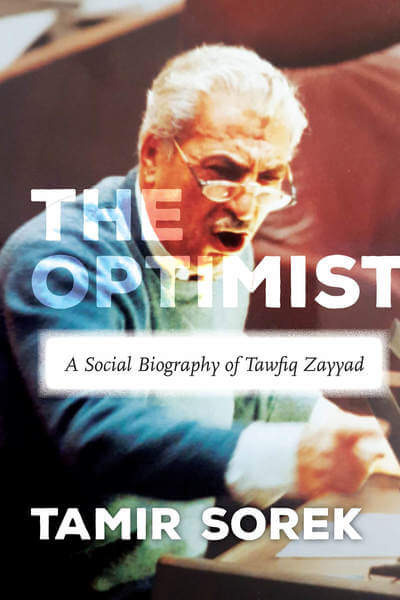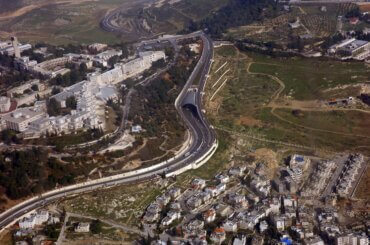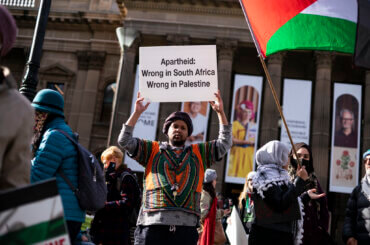THE OPTIMIST
A Social Biography of Tawfiq Zayyad
by Tamir Sorek
264 pp Stanford University Press $26
For many, including myself, the seven-decade long Israeli occupation of the Palestinian people has quite simply broken their resolve and belief in the dream of a just solution which recognizes the inalienable rights of the Palestinians and Israelis. The past two decades have been especially pessimistic regarding that vision, with the rise of Benjamin Netanyahu’s extremist, right-wing platform and rule seemingly erasing any and all possibilities for the fulfillment of Palestinian rights and justice.
For Palestinian citizens of Israel (also known as 48’ Arabs) such as myself, the Palestinian struggle has been an especially disorienting question given the status that has been imposed on us by the Israeli government. Our mere existence is full of contradictions and dilemmas, a prospect which can alienate us from the peace process and even fellow Palestinians and Arabs in the West Bank, Gaza, and diaspora.
However, I have found an answer to our quandary. In fact, it is not a new answer, it has already presented itself and has led us for decades. And it is not an it, rather a he: Tawfiq Zayyad.
In his latest book The Optimist: A Social Biography of Tawfiq Zayyad, Tamir Sorek, a Professor of Sociology at the University of Florida, presents an unprecedented, in-depth exploration of the life and work of Tawfiq Zayyad, one of the most prominent Palestinian poets and leaders. Zayyad, born in 1929, was a committed communist leader and dominant political figure within Israel who embodied the struggle of Palestinian citizens of Israel while remaining committed to the larger Palestinian struggle and unity at hand. However, it could be said that more than anything, he was an optimist – never giving up on his vision of a just peace between Palestinian and Israelis.
Sorek and his research assistants, Nareeman Jamal and Mi’ad Hasan, left no stone unturned in their research on Zayyad and his irreversible impact on the Palestinian struggle and Israeli politics.
The book starts with Zayyad’s early activism in the 1950s as he challenged the Israeli occupation and hostile military rule that Palestinians in Israel lived under. His unyielding conviction in what he believed in would become an inseparable part of his personality and political activism.
One of the earliest, and arguably most meaningful, examples of his steadfast character can be seen in one of the “best-known episodes of his life and a point of future reference” (Sorek, 61) – his brutal torture in the Israeli prison in Tiberias, to which he was sent due to a speech he gave in ‘Arraba against the Israeli government’s immoral treatment of Palestinians in the Galilee. Sorek goes into extreme detail regarding the horrendous torture Zayyad experienced, as well as the simple, yet powerful, acts of defiance.

“When he sat on a bench, a prison guard ordered him to stand up, but he refused, and two guards forced him to stand while swearing him. They then sent him directly to a solitary confinement. In the evening Zayyad was served a dinner of bread and water, which he refused to accept” (Sorek, 58). The guards tortured and beat him until he was unconscious, then woke him up by splashing water on him – a cycle they repeated numerous times during his stay at the prison. Zayyad’s torture in the Tiberias prison left an important mark on him and he frequently used his experience to mobilize Palestinian citizens of Israel.
Sorek dedicates a significant portion of the book to Zayyad’s poetry. Prior to his life as a politician in the Knesset, Zayyad was a renowned poet, known for his “poetry of protest.” Zayyad distinguished himself as a poet due to the revolutionary poems he wrote, which mobilized Palestinians both within Israel and in the West Bank and Gaza, as well as Arabs from other countries. His poetry was recognized and praised by some of the most important Arab poets at the time, including Mahmoud Darwish, Ghassan Kanafani, and Muhammad ‘Ali Taha. In his essay titled Resistance Literature in Occupied Palestine 1948–1966, Kanafani “crowned” Tawfiq Zayyad – alongside Salim Jubran, Mahmoud Darwish, and Samih al-Qasim – as the “poets of resistance” among Palestinians in Israel. Sorek elegantly inserts countless excerpts from Zayyad’s poems throughout the book, constantly grounding the events and developments discussed in the books with Zayyad’s poetry.
In addition to Zayyad’s remarkable achievements as a poet, Sorek speaks extensively of his political accomplishments in it as well. One of Zayyad’s most profound achievements was successfully leading the March 30, 1976 nationwide strike in protest of Israel’s land confiscation of Palestinian lands, which is now commemorated annually as Land Day. When the Israeli government attempted to stop the strike by meeting with the mayors of Palestinian cities in Israel, Zayyad reportedly pointed to the crowd of hundreds that gathered outside the building in support of the strike and said, ”you don’t decide whether this strike happens, they do!” Such belief in the power of the masses and class struggle is deeply rooted in Zayyad’s communist ideology which he followed passionately.
Zayyad served as both mayor of Nazareth – the largest Palestinian city in Israel – and a Knesset member for the communist Rakah party (later renamed Hadash). As mayor, he led and advocated for the establishment of the annual First of May March, in which he would give a speech to thousands of Palestinian citizens of Israel, frequently incorporating his poetry in his speeches. However, the “jewel in the crown of public mobilization,” as Sorek put it, was the yearly working camps he organized in Nazareth, which bypassed the Israeli government’s lack of funding to the municipality and quite literally built entire neighborhoods in Nazareth. The camps attracted tens of thousands of volunteers from across Israel, the West Bank, and even Eastern Bloc countries.
On the national front in the Knesset, Sorek explains that Zayyad was relentless in his pursuit of Palestinian rights for both Palestinian citizens of Israel, and those living under occupation. Zayyad’s honest, yet fierce, attitude in the Knesset, and his refusal to remain silent on the injustices committed against the Palestinian people, led him to be despised by Zionists Knesset members. Such confrontations were frequent and intense; however, Zayyad never backed down and did not hesitate to shout at the racist MKs who shared the Knesset floor with him, which you can watch below. As Sorek puts it perfectly, “In one of the most memorable moments in the history of the Knesset, Zayyad called out in a choked voice to a group of right-wing MKs, ‘You are the crazy Right,’ and then pointing to MK Ze’evi [a former general who explicitly called for a “transfer” of Arab population from the country], ‘and this is your balls, I’ve got you by the balls’” (Sorek, 264).
Zayyad’s comments above were made in the shadow of what is undoubtedly his greatest achievement in national politics in Israel. Zayyad led the Arab parties in the Knesset during their support of Yitzhak Rabin’s government coalition during the Oslo Accords, which formed an “obstructing bloc” in order to prevent the collapse of Rabin more left leaning, pro-peace bloc and the establishment of a right-wing government. However, Zayyad did not simply support Rabin’s government in return for nothing. In his typical, unwavering stance, he gave an extensive list of demands to Rabin in exchange for their support. Zayyad’s leadership led Palestinian citizens of Israel to wield unprecedented power in the Israeli Knesset, which he used to advocate on behalf of all Palestinians.
One important point Sorek makes in the book is that Zayyad and communism are inseparable. Zayyad’s vision was firmly rooted in class solidarity, anti-colonialism, and cosmopolitanism. Moreover, Zayyad did not shy from defending his views, even scolding Gamal Abdel Nasser in 1959 – the most popular Arab leader at the time, and even to this day – for adopting an anti-communist stance. Zayyad’s firm belief in Marxist ideology shaped his vision a just Palestinian-Israeli reconciliation, and constant optimism for joint Palestinian-Jewish partnership. “He sought bridges to Jewish Israelis because of his belief in a shared humanity, shared class affiliation” (Sorek, 282).
In addition, Sorek frequently highlights Zayyad’s ability to balance ideology with pragmatism. He knew how to balance his belief in Palestinian liberation, while at the same time playing within the boundaries and limitations of being an Israeli citizen. One powerful example that Sorek presents is during the 1980 work camp in Nazareth, in which volunteers from Nablus and Ramallah brought and raised Palestinian flags. “In the opening ceremony three volunteers from the West Bank waved a Palestinian flag—outlawed that same year by the Israeli government—in front of a visible contingent of Israeli police. The Israeli journalist David Halevi, who attended the event, described what followed: ‘Zayyad leaves the stage, runs between the seats, jumps above the people standing in his way, and disappears inside the gathering around the flag. After a minute, following a loud argument, he leaves with the flag. With much gentleness and respect, he folds the flag and handles it to an usher who takes it away’” (Sorek, 188). Zayyad’s actions, removing the flag and respectfully and gently folding it is an overt reflection of this pragmatic approach to the Palestinian struggle – as Sorek puts it, Zayyad recognized “the importance of the Palestinian solidarity and valuing its symbols, while also declaring: there is time and place for every symbolic statement, and one should consider the practical implications of every move” (Sorek, 189).
The title of the book, The Optimist, is a well-chosen one. Throughout the book, Sorek makes it crystal clear that no matter the circumstances, Zayyad was always optimistic about the fulfillment of Palestinian rights, peace, and his belief in the progress of humanity towards a more just and prosperous future. Zayyad led Palestinian citizens of Israel at a time when they did not know what to do and even who they were. Zayyad energized them and instilled a sense of pride and patriotism in their Palestinian identity, while at the same time having his arms open to Jewish partnership in hopes of a just peace.
Tamir Sorek’s The Optimist is a must read. Reading the story of Tawfiq Zayyad life and work is especially important today. As I write this on the 20-year anniversary of the October 2000 Events (also known as the “October Ignition”), which took place 6 years after Zayyad’s untimely death, where 12 Palestinian citizens of Israel and 1 Palestinian from Gaza were murdered by Israeli police in a hard crackdown against demonstrations, I cannot help but reflect upon Zayyad’s vision and approach to the Palestinian struggle. Our answer to our struggle has been in front of us all along.




Zayyad appreciated the imperative of building bridges, how to balance ideology and pragmatism. How to meld his belief in Palestinian liberation with a one state reality. That, “One should consider the practical implications of every move.” He understood coalition building. Where is he when we need him?